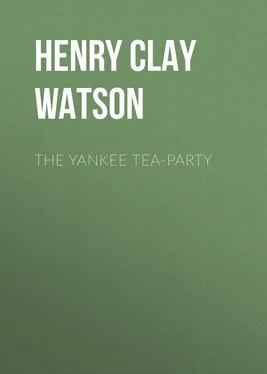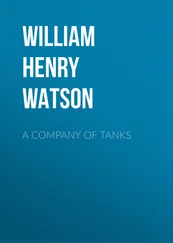Henry Clay Watson - The Yankee Tea-party
Здесь есть возможность читать онлайн «Henry Clay Watson - The Yankee Tea-party» — ознакомительный отрывок электронной книги совершенно бесплатно, а после прочтения отрывка купить полную версию. В некоторых случаях можно слушать аудио, скачать через торрент в формате fb2 и присутствует краткое содержание. Жанр: foreign_prose, История, foreign_edu, foreign_antique, на английском языке. Описание произведения, (предисловие) а так же отзывы посетителей доступны на портале библиотеки ЛибКат.
- Название:The Yankee Tea-party
- Автор:
- Жанр:
- Год:неизвестен
- ISBN:нет данных
- Рейтинг книги:5 / 5. Голосов: 1
-
Избранное:Добавить в избранное
- Отзывы:
-
Ваша оценка:
- 100
- 1
- 2
- 3
- 4
- 5
The Yankee Tea-party: краткое содержание, описание и аннотация
Предлагаем к чтению аннотацию, описание, краткое содержание или предисловие (зависит от того, что написал сам автор книги «The Yankee Tea-party»). Если вы не нашли необходимую информацию о книге — напишите в комментариях, мы постараемся отыскать её.
The Yankee Tea-party — читать онлайн ознакомительный отрывок
Ниже представлен текст книги, разбитый по страницам. Система сохранения места последней прочитанной страницы, позволяет с удобством читать онлайн бесплатно книгу «The Yankee Tea-party», без необходимости каждый раз заново искать на чём Вы остановились. Поставьте закладку, и сможете в любой момент перейти на страницу, на которой закончили чтение.
Интервал:
Закладка:
"Well, the seventeen men of our club determined, whether we were aided or not, to destroy the tea which the East India Company had sent to Boston. The plan was soon formed, as it always is when men are determined to do a thing. We wanted no captain—each man could command for himself. We resolved to disguise ourselves in Mohawk dresses, and carry such arms as would enable us to sell our lives pretty dearly; we also pledged ourselves never to reveal the names of any of the party while there was danger in it. We expected to have a fight anyhow, and the first man who faltered was to be thrown overboard with the tea. We came to Boston and found the people ripe for the deed. A great meeting was to be held at the old South Meeting-house, and we concluded to wait and see what would be done there. We lodged at this tavern, and held our councils up in this room. Well, there was a tremendous meeting at the Old South, and most of us were there to help to keep up the excitement, and to push our plan if a chance appeared. Young Quincy made a speech that stirred the people, and made them ready for anything which would show their spirit. The people voted with one voice that the tea should not be landed. We saw how things were going, came back to the tavern, put on our Mohawk dresses, and returned to the meeting. Pitts succeeded in getting into the church just about dusk and raising the war-whoop. We answered outside. Then Pitts cried out, 'Boston harbor a tea-pot to-night!'
"Ay," exclaimed Pitts, brandishing his knife above his head, "and 'hurra for Griffin's Wharf!'"
"The crowd echoed Griffin's Wharf," continued Kinnison, "and hurried towards that place. Our men joined together, returned to the tavern, got our muskets and tomahawks, and collected about seventy men together, armed with axes and hatchets. Then we pushed for the wharf where the East Indiamen, loaded with the tea, were lying. Let me see!—The ships were called the Dartmouth, the—"
"The Eleanor, and the Beaver," prompted Colson.
"Ay, the Dartmouth, the Eleanor, and the Beaver," continued Kinnison. "You see, my memory 's weak. Well, when we reached the wharf, there was a crowd of people near it. It was a clear, moonlight night, and the British squadron was not more than a quarter of a mile distant—so, you see, there was a little risk. We didn't halt long. Pitts led the way on board the Dartmouth, and we followed, musket and tomahawk in hand. Nobody offered any show of fighting for the tea. We cut open the hatches, and some of the men went down and passed up the chests, while others cut 'em open and emptied the green stuff into the water. The crew of the vessel were afeard to stir in stopping us, for we told 'em we'd shoot the first man who interfered. I tell you, there was quick work there. When we had cleared that ship of the tea, we hurried off to the others, Pitts still leading the way, and did the same kind of work for them. The people began to crowd on the wharf, and some of 'em came to help us. I guess there was about a hundred and fifty of us on the third ship, all hard at work passing up the chests, cutting 'em open and spilling the tea. Within two hours, about three hundred and fifty chests of the tea were thus destroyed. The crowd cheered us once in a while, and we knew we'd have friends enough if the red-coats attempted to attack us. When we had emptied the last chest that could be found, we gave three of the loudest cheers and gained the wharf. A drummer and fifer were ready, as Mr. Brown and Mr. Hanson can inform you, and we formed a procession and marched up to this tavern. Here the crowd gave our band of Mohawks cheer after cheer ond then dispersed. But we didn't intend to end the night's work so quietly. We had a supper prepared just where we are now eating, and Josiah Quincy and some other big men came to join us. We made a night of it, I tell you. Pitts, I think, got very drunk, so many wanted to drink with such a bold patriot."
Pitts was rather disposed to deny the assertion that he was actually drunk; but Kinnison and Colson said it was a fact, and he, at length, admitted that he was considerably excited, perhaps beyond the command of his reason. The company laughed at this 'getting around the stump,' and one of the young men proposed that Pitts' health should be drank in a glass of ale. The beverage was ordered and the health of the patriot drank with a hearty relish. The work of demolishing the eatables then went bravely on.
"Mr. Kinnison," said Mr. Colson, "there's one incident concerning that tea-party that has slipped your memory. As our procession moved from the wharf and passed the house of the tory Coffin, Admiral Montague raised the window, and said, 'Ah! boys, you have had a fine evening for your Indian caper; but mind, you've got to pay the fiddler yet!' Pitts here shouted, 'Oh! never mind, never mind, squire! Just come out, if you please, and we'll settle that bill in two minutes!' The people shouted, and the admiral thought he had better put his head in in a hurry."
"That's true," remarked Kinnison. "Well, you see, my memory is poor. Pitts would have mentioned it but for his modesty."
"I recollect it well," said Pitts. "If that tory Coffin had shown his face that night, I wouldn't have given three cents for his life."
"I think I would have had a slash at him," observed Kinnison. "I felt as savage as a Mohawk on a war-path."
"I don't want to interrupt your eating, Brown and Hanson," said Colson, "but couldn't you stir us up a little with the drum and fife?"
"Ay," added young Hand, who seemed to be the general mouth-piece of the younger portion of the company, "give us the air you played when you marched up from Griffin's Wharf."
"No objection," replied Hanson. "Come, Brown, get out your whistle. There's a little music left in it yet, I know."
The old fife was soon produced, and the drum also; and moving their chairs a short distance from the table, the veteran musicians struck up the stirring air of the old Massachusetts Song of Liberty, once so popular throughout the colonies, and supposed to have been written by Mrs. Warren.
"Hurra!" exclaimed Hand, when the musicians had concluded. "Three cheers for the music and the musicians!" and three cheers were given quite lustily by the young men, and some of the old ones.
"I have a copy of that Song of Liberty," said Hand. "Here it is, with the music. I'll sing it and you must all join in the chorus."
"Good!" said Kinnison, and the others echoed him. Hand then sang the following words, the young men joining in the chorus, and, occasionally, some of the veterans attempting to do likewise.
Come swallow your bumpers, ye tories, and roar,
That the Sons of fair Freedom are hamper'd once more;
But know that no cut-throats our spirits can tame,
Nor a host of oppressors shall smother the flame.
In freedom we're born, and, like sons of the brave,
Will never surrender,
But swear to defend her,
And scorn to survive, if unable to save.
Our grandsires, bless'd heroes, we'll give them a tear,
Nor sully their honors by stooping to fear;
Through deaths and through dangers their trophies they won,
We dare be their rivals, nor will be outdone.
In freedom we're born, &c.
Let tyrants and minions presume to despise,
Encroach on our rights, and make freedom their prize;
The fruits of their rapine they never shall keep,
Though vengeance may nod, yet how short is her sleep!
In freedom we're born, &c.
The tree which proud Haman for Mordecai rear'd
Stands recorded, that virtue endanger'd is spared;
That rogues, whom no bounds and no laws can restrain.
Must be stripp'd of their honors and humbled again.
In freedom we're born, &c.
Our wives and our babes, still protected, shall know,
Those who dare to be free shall forever be so;
On these arms and these hearts they may safely rely,
For in freedom we'll live, or like heroes we'll die.
In freedom we're born, &c.
Интервал:
Закладка:
Похожие книги на «The Yankee Tea-party»
Представляем Вашему вниманию похожие книги на «The Yankee Tea-party» списком для выбора. Мы отобрали схожую по названию и смыслу литературу в надежде предоставить читателям больше вариантов отыскать новые, интересные, ещё непрочитанные произведения.
Обсуждение, отзывы о книге «The Yankee Tea-party» и просто собственные мнения читателей. Оставьте ваши комментарии, напишите, что Вы думаете о произведении, его смысле или главных героях. Укажите что конкретно понравилось, а что нет, и почему Вы так считаете.












